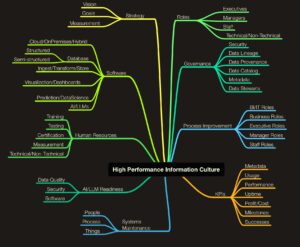Executives understand the value of high-quality, timely information. When asked why they invested in business intelligence software, they can cite examples that explain how their investments paid off. Most feel the paybacks achieved justify their investments, but they also believe that the adoption of the tools has not been as deep or wide as they had hoped.
Many people are using the tools, but the overall adoption of business intelligence has not been universally adopted. Although their ability to convert data into information has improved, they have not succeeded in creating broadly improved data literacy and an information-infused culture where everyone is making more information-informed decisions and operational effectiveness and efficiency are objectively measured.
A Harvard Business Review article (2019) by Bean and Davenport posed more specific questions to leaders on achieving effective data cultures. Here are their findings:
- 72% reported they have not forged a data culture.
- 69% reported they had not created a data-driven organization.
- 53% stated they are not yet treating data as a business asset.
- 52% admitted they were not competing on data and analytics.
My experience corroborates these findings.
Over the last decade, software vendors have released marvelous tools for storage, data transformation, data visualization, and data science. Cloud computing has exploded, making storage and performance less costly and more deployable. Data science is enabling new insights and prediction capabilities. During the past two years, Artificial Intelligence (AI) and large language models (LLMs) have exploded on the scene, creating additional ways to leverage data for forecasting, automation, and insight.
What’s Preventing Higher Adoption and Better Outcomes?
Most of the effort in deploying and maintaining BI Systems is focused on five areas:
- Software selection
- Contracting technical consulting help
- Hiring and training technical staff
- Developing high-quality data workflows and storage
- Creating accessible and actionable information
Less emphasis is placed on creating data governance frameworks beyond establishing effective security measures or data cataloging. Even rarer, management organization and incentive plan changes to encourage and measure skill development, adoption and profit improvement related to business intelligence systems.
Data Governance Considerations
Infusing every part of your organization with accessible, timely and easily understood information is essential. However, developing a governance framework that makes finding information easier, data lineage accessible and broadening knowledge of best practices over your entire organization isn’t widespread.
The primary reason to deploy a business intelligence system should be to enable everyone in your company to serve customers better, deliver value and improve profitability and stakeholder value. Achieving excellence requires a holistic view of the challenges, technical and cultural.
Extracting, transforming and harvesting data requires vigilant maintenance. I rarely see executives providing leadership in data governance, metadata management or training. In most cases, executive leaders lack fundamental knowledge of what reasonable means regarding data and governance. This is why many executives delegate this critical task to a technical leader (CIO or CDO).
The full potential of business intelligence is not realized when senior executive leadership fails to consider the level of cultural change required. Data governance is misunderstood as a security requirement that the Chief Information Officer or Chief Data Officer will manage. To change culture, executive management must mandate that everyone is trained to utilize software investments, promote understanding of data architecture, and incentivize managers to utilize the tools and reward process improvement.
Of course, your governance framework must prevent unauthorized access and data breaches through adequate security, but it must also make information more convenient, accessible, understandable and reliable.
Data isn’t valuable until you turn it into timely, accessible, and understandable information.
A well-developed data governance framework should facilitate an information culture where data-informed decision-making is ingrained in your organization’s ethos and operating processes. This is too important to delegate to technical leadership. Executive review and sign-off should be required. Senior executive endorsement of the plan, metrics and organizational change expectations lets your entire organization know that you’re serious.
An executive mandate of Key Performance Indicators to measure efficacy, adoption and financial impact should be widely communicated. This is why business intelligence investments fail to get as much adoption as executives hope.
Holistic plans must be articulated to create business value through information-enabled process improvement. Specific goals for increasing profitability, improving customer satisfaction or developing competitive advantage should become part of the expectation and measurement of building a deep and wide information skill set and culture. I’m not saying companies don’t have these goals, but I typically don’t see them as part of data governance plans.
Business intelligence systems should be considered process improvement initiatives requiring a sweeping cultural change to achieve a competitive advantage.
With this, you should have at least five primary goals:
- Excellent data quality, timeliness and accessibility.
- More efficient and effective business operations.
- Expanding the ability to react to emergent opportunities and threats.
- Improved profitability and revenue.
- Measurable improvement in data knowledge and analytical skills.
A Mind Map of Considerations
You may have a well-developed process that has been operating for years, or you may be considering building one. In either case, you must consider many different aspects of your needs, including software, business processes, training, metadata, business KPIs and metadata metrics. How can you objectify cultural change as it relates to your business analytics?
The Mind Map below is a brainstorming list of items to consider:

What This Blog Series Provides
This series of posts aims to provide a roadmap. Daily posts will cover critical aspects of building a data culture as a process improvement initiative.
Monday: Planning a Business Intelligence System
Tuesday: What is Data Governance
Wednesday: Change Management for Improved Profits
Thursday: Business Intelligence Systems Maintenance
Friday: Create a Governance Framework that Drives Adoption
The series will focus on the perspective of those deploying a new Business Intelligence system. Still, they will also provide insight into those who have mature deployments that may be underperforming expectations. After you read each post, I encourage you to ask questions. We will do our best to answer them for everyone’s benefit.

